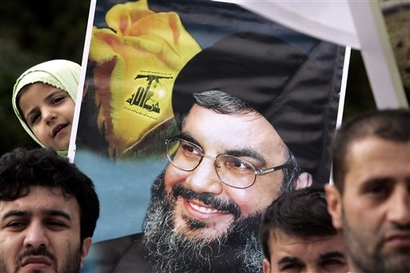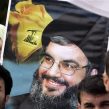
Rival Islamist Groups Vie for the Support of Southeast Turkey’s Conservative Kurdish Population
Publication: Terrorism Monitor Volume: 7 Issue: 11
By:

The enigmatic figure of Fethullah Gulen, a Turkish-born U.S. resident who runs an extensive Islamic movement in Turkey, has been warned by the Kurdish Hezbollah (Hezbollahi Kurdi – HK) against making further statements critical of Hezbollah. [1] Gulen recently argued that the Kurdistan Workers Party (Partiya Karkeren Kurdistan – PKK) and other terrorist organizations were formed by the Turkish “deep state,” but went out of control. The Turkish “deep state” (derin devlet) is a clandestine ultra-nationalist alliance alleged to include notable members of the Turkish media, armed forces, judiciary, organized crime and security services. According to Gulen:
“Some circles in Turkey [i.e. The Deep State]… formed these terrorist organizations themselves. These organizations spun out of the control of these circles due to a conflict of interests related to drug and arms trafficking. Then another team of brigands was formed in opposition to these organizations, such as Hezbollah.”
Gulen added that those forces behind the formation of the terrorist organizations within Turkey “may now be plotting new conspiracies in Turkey” (Today’s Zaman, April 9).
In issuing its warning, the Hezbollah Press Office declared the movement has abandoned violence, though some unrelated groups could use their name for violent actions: “This time the Fethullah Gulen group is trying to ignite an atmosphere of conflict. Gulen and his group are aware of the fact that they cannot act in this dangerous manner…” (Haberkapisi, April 21).
Hezbollahi Kurdi is a militant Islamist organization founded by the late Huseyin Velioglu (killed by Turkish security forces in 2000) with the goal of establishing a Kurdish Islamist state (see Eurasia Daily Monitor, March 12). Though it had a short alliance with the PKK in 1993 against the Turkish state, Hezbollah was allegedly used by the Turkish security forces against the PKK and Kurdish activists during the 1990s, when HK became known for the torture and murder of Kurds that it believed to be in favour of creating an independent socialist Kurdish state.
Referring to the PKK’s Marxist-Leninist ideological roots, Hezbollah has declared it is firmly against “PKK communism.” Hezbollah has also broadcast a YouTube video in which the ethnic-Kurdish Democratic Society Party (Demokratik Toplum Partisi – DTP) was depicted as an anti-Islamic organization. [2] The Kurdish nationalist DTP can be seen as the political branch of the PKK, similar to the Irish Sinn Fein party in Ireland, which was the political branch of the IRA.
Since 2004, Hezbollah claims to have abandoned its armed struggle and to have reinvented itself as a charity organization. The movement has also undergone ideological changes – it now rejects the Turkish state and pursues Kurdish nationalist objectives (Neue Zürcher Zeitung, December 29, 2006). Hezbollah now engages in activities similar to those of the Gulen movement, which focuses on education, religious inclusiveness and the inclusion of modern science in Islam. Hezbollah has established its own non-profit organizations, media, trade activities and even its own music groups, such as the female Peygamber Sevdalilari (“Those who love the Prophet”), a group that performed at a Hezbollah meeting in Diyarbakir in March. [3]
Turkish security forces apparently believe that Hezbollah is not as far removed from militancy as it claims. On April 27, Turkish security forces rounded up at least 20 members of Hezbullah’s “Ilim” branch during raids on Ilim bookstores, offices and houses in Elazig and Malatya (Today’s Zaman, April 28). This followed earlier roundups in March and February (Zaman, March 17; Dogan News Agency, February 18). On April 21, eleven Hezbollah members were indicted on charges of “establishing and leading an armed terrorist organization.” According to the indictment, Hezbollah has tried to “conceal its real face” through a change of strategy since 2003:
"It has been understood that the terrorist organization tried to conceal its real face that had been exposed, especially on 17 January 2000 [the day Hezbollah founder Huseyin Velioglu was killed]. The organization tried to achieve this goal by appearing to show interest in the people’s problems and by introducing its activities as innocent activities. It tried to recruit new grass roots [members] through activities that would be praised by the entire community (such as soup kitchens, the Palestinian issue, mass rain prayers, etc.)…" (Anatolia, April 23).
With an estimated two million followers, the Gülen movement has close ties with the current Islam-oriented Justice and Development Party (Adalet ve Kalkinma Partisi – AKP) government. Gulen’s followers have created a huge network of businesses, foundations, charities, and media outlets, including the popular daily newspapers Zaman (in Turkish) and Today’s Zaman (in English), as well as the television channel Samanyolu (“Silk Road)” (see Eurasia Daily Monitor, November 21, 2007).
As a result of the new policies of the Hezbollah organization, the influential Gulen movement and Hezbollah have become enemies. Both compete in Turkey’s ethnic- Kurdish southeast for the support of conservative Kurdish Muslims. Hezbollah has become increasingly active in the region, organizing mass political and religious meetings in Diyarbakir (January 4 and March 8) and in Batman (April 12). During pro-Palestinian demonstrations, Hezbollah members warned against the influence of Israel and America. Gulen is certainly aware of these Hezbollah-organized events in which thousands of Kurdish Muslims participated.
In February there were clashes between Hezbollah and PKK supporters in Adana (Dogan News, February 2, 2009). Before the March 29 local elections, HK said in a statement that they would remain neutral in the political process. At that time there were suggestions that the Kurdish Islamist organization would support the AKP, but Huseyin Yilmaz, the General Secretary of the Hezbollah front organization Mustazaf-Der, said the group wouldn’t support any political party (Habereditor.com, March 23). Yilmaz declared that the election system wasn’t based on Islam and that they will follow the example of the Kurdish theologian Said Nursi (1878-1960), who didn’t participate in the political system of the Turkish republic for religious reasons. The implication is that Hezbollah does not regard the AKP as sufficiently Islamic. Said Nursi’s Nurcu movement, which advocates combining scientific and religious education, is also the foundation of the Gulen movement.
The Gulen-owned media often report that Hezbollah, the PKK and other militant organizations have good ties with or are used by Ergenekon, a criminal network tied to the deep state and accused of plotting to overthrow the AKP government. They have also been prominent in reporting Hezbollah’s involvement in extrajudicial killings in the southeast. Bones found during excavations of “Ergenekon death wells” were the remains of missing people “allegedly killed by Hezbollah in 1990.” Again and again the Gulen media depicts Hezbollah as a “terrorist organization that reportedly has links to an illegal group within the gendarmerie known as JITEM [Jandarma Istihbarat ve Terorle Mucadele – Gendarmerie Intelligence and Counterterrorism]” (Today’s Zaman, March 18).
It’s likely the competition between Gulen movement and Hezbollah will continue. At the moment the Gulen movement is in a stronger position due to its good ties with the ruling AKP government. The possible revelation of links between Ergenekon and Hezbollah could weaken Hezbollah’s legitimacy in southeast Turkey and result in further police operations against Hezbollah front organizations. Hezbollah will likely try to respond by increasing their presence, establishing charitable foundations (in the model of the Gulen movement) and by staging religious and pro-Palestinian/anti-Israel events.
Notes:
[1] The movement is also known as the Turkish Hezbollah. Hezbollah means “party of God” in Arabic.
[2] “DTP members attack the Quran – Mustazaf-Der”. URL: https://www.youtube.com/watch?v=f-IWmYA_ogs&feature=related, March 30, 2008.
[3]: https://www.youtube.com/watch?v=SOI-EYGdjww&feature=related, March 8, 2009.





